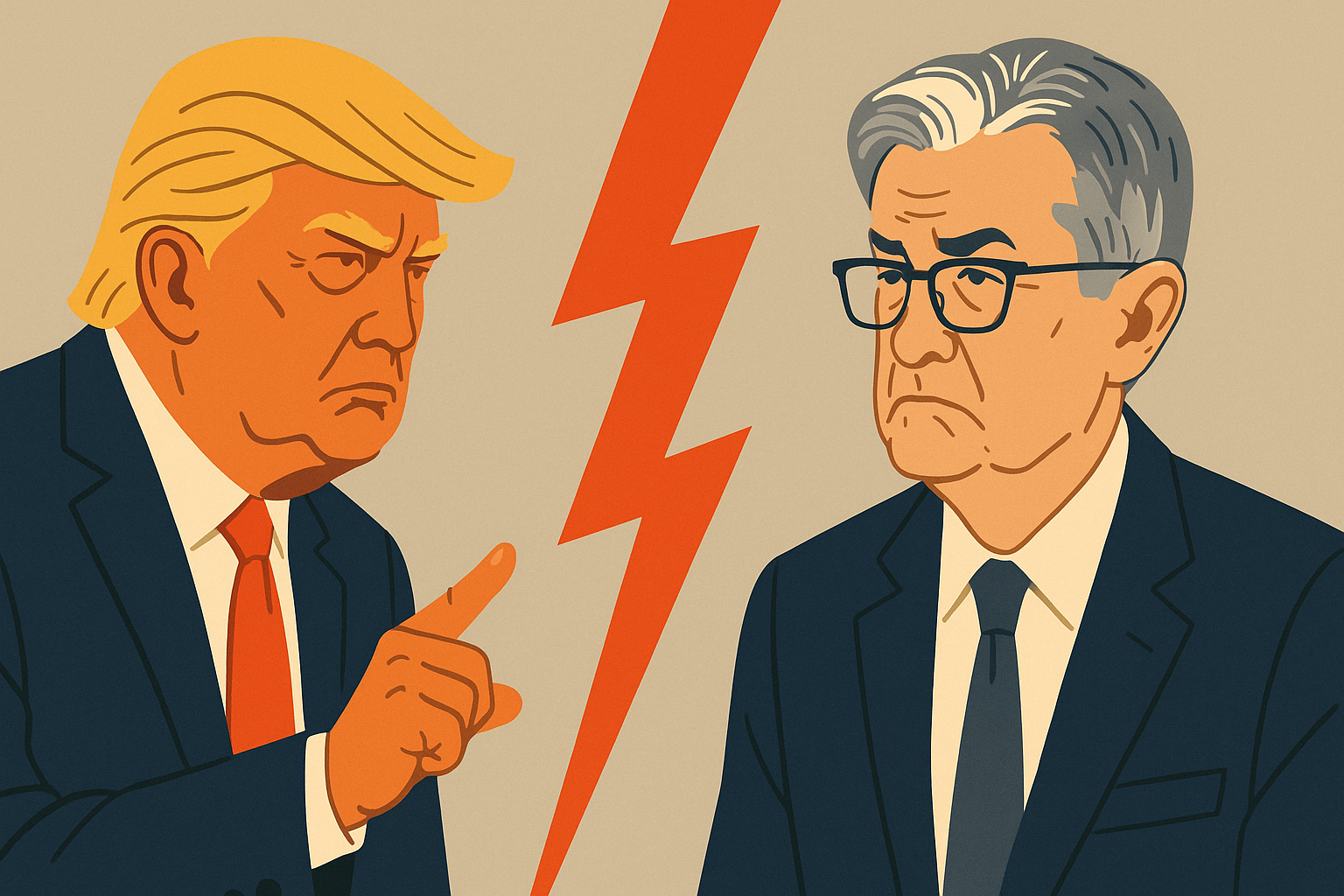Former President Donald Trump reignited concerns about the independence of the Federal Reserve this week after reportedly asking Republican lawmakers whether he should dismiss Fed Chair Jay Powell before the end of his term. The move triggered sharp market reactions, with the U.S. dollar dipping as much as 0.9% against major currencies before stabilizing.
According to multiple sources, Trump posed the question during a meeting with roughly a dozen Republican members of Congress on Tuesday night. While he later publicly downplayed the prospect of firing Powell, saying it was “highly unlikely” unless fraud were involved, his remarks fueled speculation and volatility.
Market Reaction and Public Comments
Following the report, prediction markets such as Polymarket saw odds of Powell’s removal in 2025 surge to 40%, before falling back to 20% after Trump’s partial retreat. Speaking from the Oval Office, Trump said:
“We’re not planning on doing anything… I don’t rule out anything, but I think it’s highly unlikely, unless he has to leave for fraud, and it’s possible there’s fraud.”
Despite this attempt at reassurance, Trump added that “almost every one” of the lawmakers present had encouraged him to replace Powell before his current term ends in May 2026. He also claimed that longtime acquaintances were “begging for the job.”
House Speaker Mike Johnson expressed uncertainty over Trump’s legal authority to remove Powell but suggested new leadership at the Fed would be beneficial.
Broader Criticisms of Powell
Trump’s discontent with Powell isn’t new. He has repeatedly criticized the Fed Chair—whom he nicknamed “Too Late Powell”—for not cutting interest rates fast enough. In recent weeks, Trump allies escalated their attacks, with Office of Management and Budget Director Russell Vought accusing Powell of “grossly” mismanaging a $2.5 billion renovation of the Federal Reserve’s Washington, D.C. headquarters. The Fed has not commented on these claims.
Additional Headlines and Developments
The controversy over Powell’s position unfolded amid a string of notable developments in Washington:
- Senate Budget Cuts: The U.S. Senate passed a $9 billion spending cut package, slashing funding for public broadcasting and foreign aid in a win for Trump.
- Justice Department Shake-Up: Maurene Comey, a federal prosecutor known for her role in cases involving Jeffrey Epstein and Sean “Diddy” Combs, was dismissed, reportedly under pressure from Trump-aligned circles.
- Mamdani and Wall Street: New York City mayoral candidate Zohran Mamdani, a democratic socialist, held a private meeting that won over some Wall Street skeptics.
- Epstein Fallout: Trump has lashed out at critics questioning his administration’s handling of the Epstein case files, amid new calls for transparency.
Trade Tensions and Global Reaction
On the trade front, the U.S. reported record customs revenues of $64 billion in Q2 2025—up $47 billion from the same period in 2024—largely due to Trump’s aggressive tariffs. Despite steep levies imposed on exports from countries like Mexico, Canada, and China, major U.S. trading partners have shown restraint in retaliating.
Analysts attribute this to America’s economic dominance. “We can’t be confrontational with the U.S.,” said Dan Nowlan, adviser to former Canadian premier Stephen Harper. U.S.-Canada trade makes up 20% of Canadian GDP, but only 2% of the U.S. economy.
Even countries like China and Canada have avoided major confrontations. Ottawa recently shelved plans for a digital services tax and refrained from matching Trump’s move to double steel tariffs to 50%.
Expert Views
- Chatham House’s Creon Butler warned that countries are weighing short-term diplomacy against long-term supply chain risks.
- Martin Wolf of the FT condemned Trump’s tariff strategy as “wicked,” urging coordinated international retaliation.
- Janan Ganesh noted a growing ideological split between Trump and the broader MAGA movement, potentially pushing it toward more extreme positions.
- Alan Beattie called for a revamp of the EU’s trade policy to confront Trump’s escalating economic nationalism.
As Trump continues to blend monetary and trade policy with political maneuvering, concerns are mounting over institutional stability both at home and abroad. The Fed chair’s future remains uncertain—mirroring the broader unpredictability of the Trump agenda.



